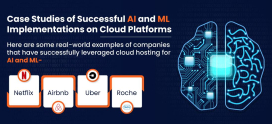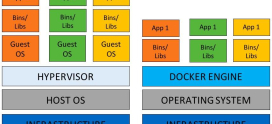How is AI changing the world of web hosting for the better?
introduction
With technology constantly evolving, Artificial Intelligence (AI) has emerged as an influential force in various industries. One sector where its impact is becoming increasingly evident is web hosting. In this blog post, we will look at how AI is revolutionizing the world of web hosting, bringing positive changes that improve performance, security, and the overall user experience.
Understanding AI in web hosting
Before we dive into integrating AI into web hosting, it is important to understand the basics of AI's role in this context. Artificial intelligence in web hosting refers to the use of advanced algorithms and ML to optimize various aspects of hosting services. From resource allocation and load balancing to security protocols and predictive analytics, AI algorithms enable web hosting providers to offer more efficient, reliable, and adaptable services.
How is AI integrated into web hosting services?
Dynamic resource allocation:
AI algorithms not only analyze website traffic patterns, but also take regional and seasonal variations into account, making peak-time predictions even more accurate. This level of detail enables fine-tuned resource allocation and optimizes performance under different circumstances. In addition, AI continuously evaluates historical data to adjust and refine its predictions, resulting in more adaptive and accurate resource allocation over time.
Automated troubleshooting:
In addition to identifying problems, AI-powered systems today can also perform complex diagnostics and determine the root causes of problems. Automated troubleshooting even goes so far as to predict potential future problems based on historical patterns. This allows preventative measures to be taken to further minimize downtime. In addition, AI-powered systems increasingly use natural language processing, making troubleshooting and error detection more intuitive and user-friendly.
Predictive Analytics:
The role of AI in predictive analytics has expanded to include trend forecasting and anomaly detection on a larger scale. By integrating external data sources and considering market trends, hosting providers can anticipate challenges and opportunities, promoting a more strategic and forward-thinking approach to website management. The predictive power of AI now extends to analyzing user behavior, helping companies adapt their content and services to evolving customer expectations.
Individual user experience:
User experience customization today happens in real time. AI algorithms continuously learn from user interactions and dynamically adjust content delivery, layout, and features. This ensures an evolving, personalized experience that stays active and connected over time. In addition, AI-driven user experience personalization extends to voice and visual interfaces, taking into account a wider range of user preferences and accessibility needs.
Intelligent resource scaling:
AI-driven systems can now not only allocate resources but also dynamically scale them up or down as needed. This adaptability enables cost optimization by ensuring resources are allocated efficiently and avoiding unnecessary spending during low-traffic periods. In addition, AI's role in resource scaling extends to predictive cost analytics, helping organizations make informed decisions about infrastructure investments.
Optimizing energy efficiency:
AI is increasingly being used to increase data center energy efficiency. By analyzing patterns in resource consumption and performance, hosting providers can implement energy-saving measures that contribute to sustainability goals and reduce operational costs. These include real-time adjustments to power consumption, optimizing cooling systems, and incorporating renewable energy sources into the hosting infrastructure.
Real-time traffic management:
AI algorithms analyze incoming traffic in real-time and make instant decisions on routing and load balancing. This increases website performance and guarantees that potential traffic spikes are handled seamlessly without impacting the overall user experience. In addition, AI in traffic management extends to adaptive content prioritization, ensuring the delivery of critical content during high-traffic periods.
Optimization of the Content Delivery Network (CDN):
AI is used to optimize the performance of content delivery networks. By dynamically selecting the most efficient CDN server based on user locations and network conditions, hosting providers can ensure faster content delivery and lower latency. In addition, AI-driven CDN optimization includes predictive content caching, anticipating user preferences, and proactively delivering content for an even faster user experience.
Proactive security measures:
AI is expanding its impact on cybersecurity by proactively identifying and remediating vulnerabilities. Automated security protocols continuously analyze evolving threats and implement countermeasures, creating a robust defense against the ever-changing cyber threat landscape. In addition, AI-driven security measures include advanced anomaly detection, behavioral analysis, and threat intelligence integration for a more comprehensive and adaptive security posture.
Intelligent database management:
AI is used in database management to optimize query performance, reduce latency, and ensure data integrity. This results in faster response times and a more effective end-user experience, especially for websites that rely heavily on database-driven content. In addition, AI-driven database management includes predictive data caching and query optimization, streamlining database operations, and improving overall website performance.
Importance of AI in protecting websites and user data
Advanced threat detection:
AI-powered security systems can detect and respond to potential threats faster than traditional methods. Machine learning algorithms examine patterns and anomalies to detect malicious activity, providing a robust defense against cyber threats. In addition, AI-powered threat detection systems continuously evolve through adaptive learning, staying one step ahead of new threats and providing a proactive defense mechanism.
Fraud prevention:
AI plays a crucial role in detecting and preventing fraudulent activities such as phishing attacks and unauthorized access. This is critical for e-commerce websites and platforms that manage sensitive user data. Advanced AI fraud prevention models now leverage behavioral analytics, biometric authentication, and real-time transaction monitoring to detect and prevent a wider range of fraudulent activities, ensuring a safe online environment.
Data encryption and data protection:
AI helps strengthen data encryption rules and ensure that user data remains confidential and secure. This is of utmost importance at a time when data breaches pose significant risks to both businesses and users. In addition, AI-driven encryption solutions include homomorphic encryption and quantum-resistant algorithms that respond to new threats and ensure the long-term privacy and integrity of user data.
Behavioral biometrics:
AI improves website security by incorporating behavioral biometrics to verify user identities based on unique behavior patterns, including mouse movements, typing speed, and touchscreen interactions, providing an additional layer of authentication beyond traditional methods.
Automating incident response:
AI is used to automate incident response operations, reducing the time to detect and contain security incidents. Automated response systems analyze data in real time, enable quick and effective action against potential threats, and minimize the impact of security breaches.
Threat intelligence integration:
AI integrates threat intelligence feeds and continually updates security systems with the latest information on evolving threats and vulnerabilities. This proactive approach ensures that websites are well prepared for the latest cyber threats in an ever-changing threat landscape.
Deep package inspection:
AI-driven deep packet inspection technology enables thorough analysis of network traffic and enables detection of hidden threats in data packets. This improves the ability to identify and block malicious activity and provides comprehensive protection against sophisticated cyberattacks.
User and Entity Behavior Analysis (UEBA):
AI-driven UEBA systems analyze user behavior patterns to detect unusual tasks that may indicate unauthorized access or compromised accounts. This proactive approach helps detect security incidents before they escalate, protecting sensitive user data.
Improving multi-factor authentication (MFA):
AI helps improve multi-factor authentication by incorporating adaptive authentication methods. This includes contextual information such as device detection, location awareness, and user behavior analysis, making MFA more secure and user-friendly.
Continuous security monitoring:
AI enables continuous security monitoring by analyzing network and system logs in real time. This continuous monitoring ensures that suspicious activity or deviations from normal behavior are quickly detected and remedied, strengthening the overall security posture of websites.
Also read: Web hosting requirements for eCommerce websites
Packing
The integration of artificial intelligence into web hosting services represents a significant advancement in the industry. From optimizing resource usage to improving security measures, AI is bringing about positive changes that benefit both hosting providers and website owners.
As technology continues to evolve, the symbiotic relationship between AI and web hosting is likely to lead to even more innovative solutions and continue to change the digital landscape for the better. Stay tuned as we report on the constant advancement of artificial intelligence in web hosting, making the online world more efficient, secure, and user-friendly.









